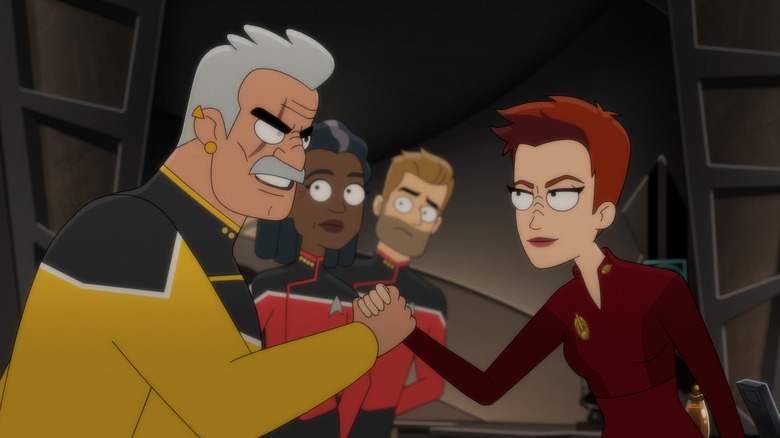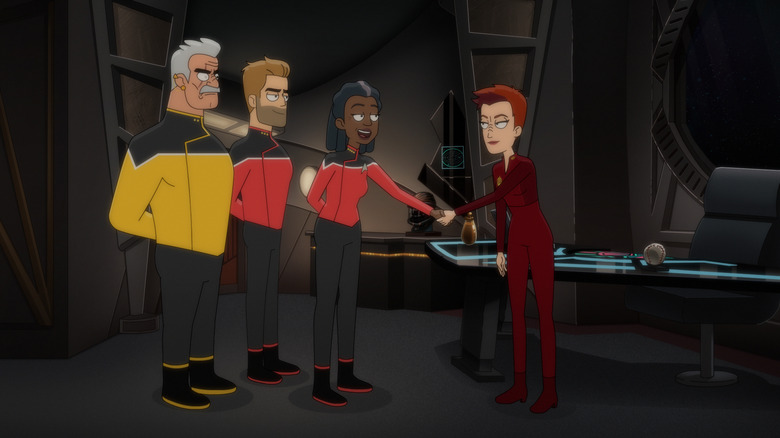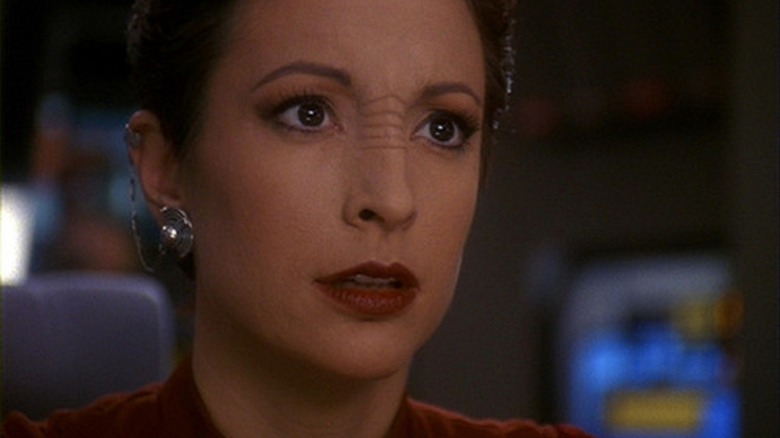Star Trek: Deep Space Nine Star Nana Visitor Says Kira Nerys Is Neither Good Nor Bad — She's Both [Exclusive]
The latest episode of "Star Trek: Lower Decks," called "Hear All, Trust Nothing," is set aboard Deep Space Nine. It's been 23 years since "Star Trek: Deep Space Nine" went off the air, but it's only been about eight years in the Trek timeline, so not too much has changed aboard the station. The Promenade is still open for business, the clever ultra-capitalist Quark (Armin Shimerman) is still running his bar in a semi-criminal fashion, and the Bajoran Col. Kira Nerys (Nana Visitor) is still the commander of the station, a position she took up in "What You Leave Behind," the show's final episode. She's even sporting the same uniform and hairdo as when he last saw her.
Col. Kira is one of the more fascinating characters on a show full of them. In DS9's mythology, Kira spent many years as a resistance fighter while her planet was being militarily occupied — and her people relentlessly murdered — by the Nazi-like Cardassians. Indeed, Deep Space Nine is a Cardassian construct. When the occupation ended, Kira took a position on the station, aiming to rebuild it and aid in her planet's reconstruction. Over the course of the series, audiences learned that Kira committed many acts of brutal violence during the war, all of which she feels were perfectly justified. What is the difference, one might ask, between a resistance fighter and an outright terrorist? Through Kira, "Deep Space Nine" delved into many sticky ethical quandaries such as this.
In an interview with /Film's own Danielle Ryan, Visitor talked about returning to the role after so many years, and how Kira's character is both positive and negative, depending on one's perspective.
Old war buddies
A conceit from the episode is that Col. Neryl is old friends with the "Lower Decks" character Lt. Shaxs (Fred Tatasciore). Shaxs is presented throughout the series as a gruff, hot-tempered, slightly-too-violent, barrel-chested zaddy with a penchant for yelling. He has a scar over his eye, and once actually died (!) saving Ens. Rutherford. In one of the show's more clever jokes, Shaxs returns from the dead off-screen, with the main characters on the show — ensigns all — uninformed as to how. Of course a character like Shaxs would know Col. Nerys, and the two bicker as to who saved the other's life the most often.
The bickersome relationship was something Visitor was fond of, and loved that a non-human character would afford her the chance to play with so many human qualities. She said, "I loved that she had war buddies and that she shared this and this one-upmanship, which is such a human thing. I do say this, that being Bajoran has allowed me to play the most human character I've ever played."
Any philosopher will tell you that wartime ethics differ from peacetime ethics. What is considered heroic in war is considered dark and horrible off the battlefield. Visitor was aware of that, and, having played Kira for seven seasons, understood that her actions — from her perspective — were clear and honest. Just like real people, Kira was complex. She reasoned:
"Some of that, as you point out, is how people perceive her. For her, she had goals and intentions set for her people, and that makes for a very clear path. So it's not confusing, but the way she was perceived is in this binary way. Is she good or is she bad? Well, she was both."
Duet
Example:
One of the best "Deep Space Nine" episodes about Kira is likely the first season episode "Duet" (June 14, 1993). In the episode, Kira apprehends a Cardassian named Marritza (Harris Yullin) who is aboard the station seeking treatment for a rare disease. Kira immediately arrests him by dint of his species. Kira is aggressive and hellbent on making Cardassians face justice. Marritza's disease, it turns out, was a condition that afflicted miners only at a very specific wartime location, indicating that Marritza was present at a notorious Bajoran massacre. Marritza was, in actuality, a vicious war criminal named Darhe'el, traveling in disguise.
Kira and Darhe'el talk about their perspectives on the war, and how both committed acts of murder for reasons they believed to be right. She, nobly, to free her people from oppressors. He, militarily, to assert his empire's dominance. His patriotism was, in his mind, a virtue. His violence, strength. Kira openly admits she regrets a good deal of her actions, a regret that Darhe'el called "convenient," given that she murdered his peers.
Marritza had cosmetic surgery to look like Darhe'el, and — out of extreme guilt — gave himself over to the Bajorans as, essentially, a political sacrifice. Now the Bajorans can have a form of absolution in executing him. Kira begins to realize that execution, wartime violence, and racial hatred are going to be difficult wounds to heal. It's in this episode that Kira begins to grow from having a freedom fighter mindset to a post-war, peacetime mindset.
Visitor had many, many chances to explore Kira. Seeing her again on "Lower Decks" is a delight.


